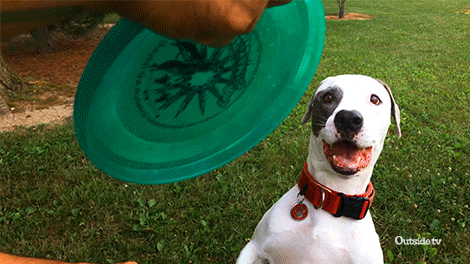Drop Everything And See What The Dog Doin'
It’s rare to find a post online that gets right to the point. There’s always a lot of lead-up, whether it’s background information or an explanation of the intent of the post.
Kind of like what’s happening right now. But, a Redditor wanted to get down to brass tacks and asked straight up: “Dog owners of Reddit, what the dog doin?”
Truly a simple yet compelling question. Over 1000 people thought so too, as the comments flooded with responses about what their dogs were doing. As Dr. Ramani Durvasula, a clinical psychologist, notes, “Pets provide us with unconditional love and companionship, which can be a source of joy and comfort.”
A lot of pups were snoozing, some were being noisy, and a touching comment thread opened up about beloved pups that had crossed the rainbow bridge. We gathered some of the top responses to share today, so keep scrolling to see what the dog doin’. ```
Drakmamman asking the important questions

1. Both doggos are being their own versions of noisy

2. A prediction that's very likely correct

Research into the psychological benefits of pet ownership reveals that dogs offer more than companionship; they provide a unique source of emotional support. A study conducted by the Human-Animal Bond Research Institute found that pet owners report lower levels of stress and anxiety, often attributing this relief to the unconditional love and companionship dogs provide. The presence of a dog can trigger the release of oxytocin, often referred to as the 'love hormone,' which promotes feelings of bonding and affection. This biological response not only enhances emotional well-being but also fosters a sense of security in social interactions, making pet ownership a powerful tool for mental health.
The Importance of Canine Playfulness
One of the most delightful aspects of dog ownership is their playful nature. Research suggests that play is essential for dogs, contributing to their emotional and physical well-being. Engaging in play allows dogs to express their innate behaviors and fosters social bonding.
According to a study in the Journal of Animal Behavior, regular play can also reduce stress and anxiety in dogs, promoting overall mental health.
3. Give the poor baby their frisbees


4. Suffering in a cone

The Power of Connection
According to research published in the Journal of Personality and Social Psychology, owning a dog can significantly enhance social connections. The study indicates that dog owners are more likely to engage with others in their community compared to non-owners. This is attributed to the social facilitation effect of walking a dog, which naturally prompts conversations and interactions with other dog owners or passersby. Psychologists have noted that these social interactions can combat loneliness and create a sense of belonging, which is crucial for overall mental health.
Moreover, playtime can enhance the bond between dogs and their owners. When humans participate in playful activities with their dogs, such as fetch or tug-of-war, it creates a shared experience that strengthens their emotional connection.
This shared joy can lead to increased levels of oxytocin, the bonding hormone, which is beneficial for both parties involved.

5. Herding cats


Dogs also serve as excellent emotional regulators for their owners. A clinical psychologist has noted that interacting with pets can help reduce cortisol levels— a hormone associated with stress— and enhance feelings of calmness. This aligns with findings from a study published in the journal Anthrozoös, which demonstrated that simply petting a dog can lower blood pressure and heart rate. For individuals struggling with anxiety or depression, incorporating a dog into their daily routine can be a simple yet effective strategy for managing symptoms and improving daily mood.
The Psychological Benefits of Laughter
Watching dogs engage in silly antics can also provide significant psychological benefits to their owners. Laughter has been shown to reduce stress and improve mood, contributing to overall well-being.
A study published in the International Journal of Humor Research indicates that humor can promote resilience and enhance one's ability to cope with life's challenges.
6. Taking a nippy-nap

7. Being a good boy

8. Working and resting

Navigating Attachment Styles
Dogs can also play a role in shaping our attachment styles, which are crucial in forming relationships. According to research by Dr. Philip Shaver and Dr. Mario Mikulincer, our interactions with pets can mirror our attachment behaviors in human relationships. For instance, individuals with secure attachment styles often form strong bonds with their dogs, leading to mutual trust and affection. On the other hand, those with insecure attachment may project their anxieties onto their pets, which can complicate the relationship. Understanding these dynamics can help dog owners cultivate healthier attachments and improve their relational skills.
In fact, sharing a laugh with a dog can create a sense of happiness that permeates into other areas of life. This emotional uplift can strengthen the bond between a dog and its owner, making interactions more enjoyable and fulfilling.
Encouraging playful behavior in dogs not only benefits their emotional health but also enhances the owner's quality of life.
9. Bringing the DRAMA

10. Doing stuff they shouldn't be doing

11. Cozied up in bed with PJs on

One of the most compelling aspects of canine companionship is their ability to promote physical activity, which is crucial for psychological well-being. Studies show that regular physical activity is associated with reduced symptoms of anxiety and depression. A report from the Mayo Clinic highlights that dog owners tend to walk more frequently, which provides not only exercise but also a structured routine that can stabilize mood. Setting a goal to take your dog for a walk at least once a day can serve as a dual benefit for both pet and owner, enhancing physical health while simultaneously boosting mental health.
Understanding Canine Behavior
Understanding the behaviors that dogs exhibit during play can enhance the owner-pet relationship. Behavioral psychologists emphasize that recognizing a dog's body language and vocalizations can help owners respond appropriately to their needs.
Dr. John Paul Scott's research on dog behavior highlights the importance of social play in developing canine skills and emotional intelligence, which can benefit interactions with humans as well.
12. Rejoicing their owners return

13. Sleeping

14. Thriving in Doggy Heaven

Mindfulness and Dogs
The presence of a dog can encourage mindfulness, a practice that has gained traction in psychological treatment for its numerous benefits. Research from the University of Massachusetts suggests that engaging with pets can foster a heightened sense of awareness and presence, as dogs often live in the moment. This can be particularly beneficial for individuals dealing with anxiety, as mindfulness practices can reduce rumination and promote emotional regulation. Incorporating mindful activities, such as observing your dog's behavior or simply focusing on the sensations during a walk together, can enhance emotional resilience.
For instance, knowing when a dog is feeling overwhelmed or overstimulated allows owners to adjust play activities accordingly, fostering a more positive experience for both parties. This understanding can create a supportive environment that promotes healthy emotional expression.
Comic linked above

15. Tiring himself out for a good nap

16. Bundled up warm and cozy for a nap

Additionally, dogs can serve as a bridge for social interactions, especially for individuals who are socially anxious. A study published in the journal *Social Psychological and Personality Science* found that individuals with dogs are perceived as more approachable and friendly by others. This perception can help break down barriers and ease anxiety in social situations. For those who struggle to make connections, taking a dog to a park or a dog-friendly event provides a natural context for engaging with others, thereby improving social skills and reducing feelings of isolation.
Creating Engaging Play Environments
Owners can enhance their dog's play experience by creating engaging environments that stimulate their senses. Research indicates that dogs thrive in environments that provide opportunities for exploration and interaction.
Using toys, obstacle courses, or even social playdates with other dogs can encourage physical activity and mental engagement, leading to happier and healthier pets.
17. Using their owners legs as a bed

18. Recharging in the sun


Therapeutic Benefits of Dogs
Animal-assisted therapy is gaining recognition as an effective intervention for various mental health conditions. According to the American Psychological Association, therapy dogs can help individuals cope with a range of issues, including PTSD, depression, and anxiety. The presence of a trained therapy dog can create a safe environment that encourages emotional expression and helps facilitate therapeutic discussions. Moreover, studies show that clients often feel more comfortable sharing sensitive information in the presence of a dog, thus enhancing the therapeutic alliance between client and therapist.
By incorporating a variety of stimulating activities, owners can help prevent behavioral issues that arise from boredom or lack of mental stimulation. This proactive approach not only benefits the dog but also fosters a more enjoyable and rewarding relationship.
19. Telepathically reminding their owner about dinner


20. In a food coma

Understanding the role of dogs in our lives also ties into the broader psychological principle of attachment theory. John Bowlby, the father of attachment theory, posited that secure attachments in early life can lead to healthier relationships in adulthood. Dogs, in their capacity to provide unconditional love, can serve as a secure base for their owners, fostering emotional stability and resilience. For those who may have experienced insecure attachments in human relationships, developing a bond with a dog can provide a corrective emotional experience, promoting healing and healthier relational patterns.
The Power of Routine and Play
Establishing a routine that includes regular playtime can be crucial for both dogs and their owners. Research suggests that routines provide structure that can be comforting and reduce anxiety in pets.
For owners, having a set playtime can also create a sense of responsibility and purpose, contributing positively to their mental health.
21. Trying his best


22. Hibernating

Enhancing Emotional Intelligence
Engaging with dogs can also enhance emotional intelligence, which is the ability to recognize and manage one's own emotions while empathizing with others. Research published in the *Journal of Research in Personality* indicates that pet ownership correlates with higher levels of empathy and emotional intelligence among owners. This is likely due to the need to tune into a dog's emotional cues, which can mirror the emotional states of humans. By fostering a deeper emotional connection with their pets, owners can develop skills that translate into improved interpersonal relationships and emotional awareness.
Creating a balanced routine that incorporates play, exercise, and training can lead to a well-adjusted dog and a fulfilling owner experience. This commitment to play can enhance the overall quality of life for both dogs and their humans.
23. Bothering grandma

Honestly, thank all the gods for dogs, big and small and in-between. They're the best of everything.
From providing love and affection, to being a source of humor and entertainment. All of their good traits more than make up for any of the bad bits, like shoe or underwear chewing or inside potty accidents.
What about you and your dog, dear reader? What the dog doin'?
Psychological Analysis
This interaction encapsulates the joy and emotional enrichment that dogs provide through their playful antics. Understanding the significance of play can enhance the bond between dogs and their owners, promoting a happier and healthier life for both.
Analysis generated by AI
Analysis & Alternative Approaches
In conclusion, the playful nature of dogs offers numerous psychological benefits for both pets and their owners. Research supports the notion that engaging in play fosters emotional connections and enhances mental well-being.
By prioritizing playtime and understanding canine behavior, owners can cultivate a joyful and fulfilling relationship with their dogs, leading to mutual happiness.
Psychological Framework & Solutions
In summary, the presence of dogs in our lives offers a multitude of psychological benefits, ranging from enhanced emotional support to improved social interactions. Understanding the dynamics of pet ownership can help individuals leverage their relationships with dogs for better mental health outcomes. As research continues to reveal the depth of this human-animal bond, it becomes increasingly clear that dogs not only enrich our lives but can also serve as powerful allies in our journey toward emotional well-being.



